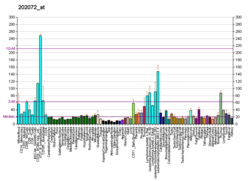HNRNPL
Heterogeneous nuclear ribonucleoprotein L is a protein that in humans is encoded by the HNRNPL gene.[5][6]
Function
Heterogeneous nuclear RNAs (hnRNAs) which include mRNA precursors and mature mRNAs are associated with specific proteins to form heterogeneous ribonucleoprotein (hnRNP) complexes. Heterogeneous nuclear ribonucleoprotein L is among the proteins that are stably associated with hnRNP complexes and along with other hnRNP proteins is likely to play a major role in the formation, packaging, processing, and function of mRNA. Heterogeneous nuclear ribonucleoprotein L is present in the nucleoplasm as part of the HNRP complex. HNRP proteins have also been identified outside of the nucleoplasm. Exchange of hnRNP for mRNA-binding proteins accompanies transport of mRNA from the nucleus to the cytoplasm. Since HNRP proteins have been shown to shuttle between the nucleus and the cytoplasm, it is possible that they also have cytoplasmic functions. Two transcript variants encoding different isoforms have been found for this gene.[6]
Interactions
HNRNPL has been shown to interact with:
References
- ^ a b c ENSG00000282947 GRCh38: Ensembl release 89: ENSG00000104824, ENSG00000282947 – Ensembl, May 2017
- ^ a b c GRCm38: Ensembl release 89: ENSMUSG00000015165 – Ensembl, May 2017
- ^ "Human PubMed Reference:". National Center for Biotechnology Information, U.S. National Library of Medicine.
- ^ "Mouse PubMed Reference:". National Center for Biotechnology Information, U.S. National Library of Medicine.
- ^ Pinol-Roma S, Swanson MS, Gall JG, Dreyfuss G (January 1990). "A novel heterogeneous nuclear RNP protein with a unique distribution on nascent transcripts". J Cell Biol. 109 (6 Pt 1): 2575–87. doi:10.1083/jcb.109.6.2575. PMC 2115934. PMID 2687284.
- ^ a b "Entrez Gene: HNRPL heterogeneous nuclear ribonucleoprotein L".
- ^ Oberdoerffer S, Moita LF, Neems D, Freitas RP, Hacohen N, Rao A (Aug 2008). "Regulation of CD45 alternative splicing by heterogeneous ribonucleoprotein, hnRNPLL". Science. 321 (5889): 686–91. doi:10.1126/science.1157610. PMC 2791692. PMID 18669861.
- ^ a b c Kim JH, Hahm B, Kim YK, Choi M, Jang SK (May 2000). "Protein-protein interaction among hnRNPs shuttling between nucleus and cytoplasm". J. Mol. Biol. 298 (3): 395–405. doi:10.1006/jmbi.2000.3687. PMID 10772858.
- ^ Hahm B, Cho OH, Kim JE, Kim YK, Kim JH, Oh YL, Jang SK (April 1998). "Polypyrimidine tract-binding protein interacts with HnRNP L". FEBS Lett. 425 (3): 401–6. doi:10.1016/S0014-5793(98)00269-5. PMID 9563502.
Further reading
- Dreyfuss G, Choi YD, Adam SA (1990). "The ribonucleoprotein structures along the pathway of mRNA formation". Endocr. Res. 15 (4): 441–74. doi:10.3109/07435808909036348. PMID 2576798.
- Rasmussen HH, van Damme J, Puype M, et al. (1993). "Microsequences of 145 proteins recorded in the two-dimensional gel protein database of normal human epidermal keratinocytes". Electrophoresis. 13 (12): 960–9. doi:10.1002/elps.11501301199. PMID 1286667.
- Hahm B, Cho OH, Kim JE, et al. (1998). "Polypyrimidine tract-binding protein interacts with HnRNP L". FEBS Lett. 425 (3): 401–6. doi:10.1016/S0014-5793(98)00269-5. PMID 9563502.
- Shih SC, Claffey KP (1999). "Regulation of human vascular endothelial growth factor mRNA stability in hypoxia by heterogeneous nuclear ribonucleoprotein L". J. Biol. Chem. 274 (3): 1359–65. doi:10.1074/jbc.274.3.1359. PMID 9880507.
{{cite journal}}: CS1 maint: unflagged free DOI (link) - Hamilton BJ, Nichols RC, Tsukamoto H, et al. (1999). "hnRNP A2 and hnRNP L bind the 3'UTR of glucose transporter 1 mRNA and exist as a complex in vivo". Biochem. Biophys. Res. Commun. 261 (3): 646–51. doi:10.1006/bbrc.1999.1040. PMID 10441480.
- Dias Neto E, Correa RG, Verjovski-Almeida S, et al. (2000). "Shotgun sequencing of the human transcriptome with ORF expressed sequence tags". Proc. Natl. Acad. Sci. U.S.A. 97 (7): 3491–6. doi:10.1073/pnas.97.7.3491. PMC 16267. PMID 10737800.
- Kim JH, Hahm B, Kim YK, et al. (2000). "Protein-protein interaction among hnRNPs shuttling between nucleus and cytoplasm". J. Mol. Biol. 298 (3): 395–405. doi:10.1006/jmbi.2000.3687. PMID 10772858.
- Shnyreva M, Schullery DS, Suzuki H, et al. (2000). "Interaction of two multifunctional proteins. Heterogeneous nuclear ribonucleoprotein K and Y-box-binding protein". J. Biol. Chem. 275 (20): 15498–503. doi:10.1074/jbc.275.20.15498. PMID 10809782.
{{cite journal}}: CS1 maint: unflagged free DOI (link) - Ito M, Shichijo S, Tsuda N, et al. (2001). "Molecular basis of T cell-mediated recognition of pancreatic cancer cells". Cancer Res. 61 (5): 2038–46. PMID 11280764.
- Kuninger DT, Izumi T, Papaconstantinou J, Mitra S (2002). "Human AP-endonuclease 1 and hnRNP-L interact with a nCaRE-like repressor element in the AP-endonuclease 1 promoter". Nucleic Acids Res. 30 (3): 823–9. doi:10.1093/nar/30.3.823. PMC 100287. PMID 11809897.
- Söderberg M, Raffalli-Mathieu F, Lang MA (2002). "Inflammation modulates the interaction of heterogeneous nuclear ribonucleoprotein (hnRNP) I/polypyrimidine tract binding protein and hnRNP L with the 3'untranslated region of the murine inducible nitric-oxide synthase mRNA". Mol. Pharmacol. 62 (2): 423–31. doi:10.1124/mol.62.2.423. PMID 12130696.
- Hui J, Stangl K, Lane WS, Bindereif A (2007). "HnRNP L stimulates splicing of the eNOS gene by binding to variable-length CA repeats". Nat. Struct. Biol. 10 (1): 33–7. doi:10.1038/nsb875. PMID 12447348.
- Strausberg RL, Feingold EA, Grouse LH, et al. (2003). "Generation and initial analysis of more than 15,000 full-length human and mouse cDNA sequences". Proc. Natl. Acad. Sci. U.S.A. 99 (26): 16899–903. doi:10.1073/pnas.242603899. PMC 139241. PMID 12477932.
- Costain WJ, Mishra RK (2003). "PLG regulates hnRNP-L expression in the rat striatum and pre-frontal cortex: identification by ddPCR". Peptides. 24 (1): 137–46. doi:10.1016/S0196-9781(02)00286-3. PMID 12576095.
- Hui J, Reither G, Bindereif A (2003). "Novel functional role of CA repeats and hnRNP L in RNA stability". RNA. 9 (8): 931–6. doi:10.1261/rna.5660803. PMC 1370459. PMID 12869704.
- Gulesserian T, Engidawork E, Fountoulakis M, Lubec G (2004). "Decreased brain levels of Lupus La protein and increased U5 small ribonucleoprotein-specific 40 kDa protein in fetal Down syndrome". Cell. Mol. Biol. (Noisy-le-grand). 49 (5): 733–8. PMID 14528909.
- Ota T, Suzuki Y, Nishikawa T, et al. (2004). "Complete sequencing and characterization of 21,243 full-length human cDNAs". Nat. Genet. 36 (1): 40–5. doi:10.1038/ng1285. PMID 14702039.
- Cheng J, Kapranov P, Drenkow J, et al. (2005). "Transcriptional maps of 10 human chromosomes at 5-nucleotide resolution". Science. 308 (5725): 1149–54. doi:10.1126/science.1108625. PMID 15790807.






